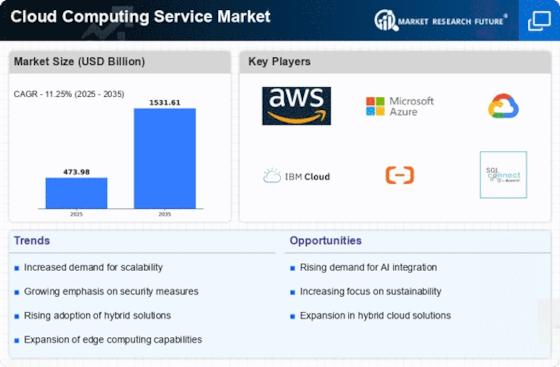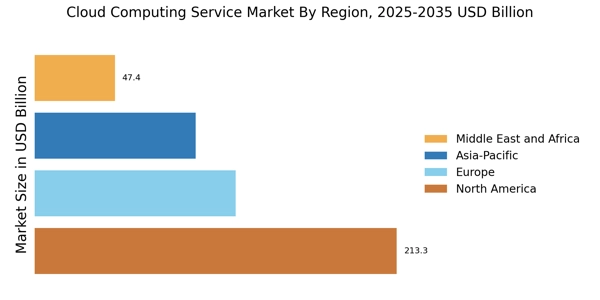Rising Demand for Scalable Solutions
The Cloud Computing Service Market experiences a notable surge in demand for scalable solutions. Organizations increasingly seek flexibility in their IT infrastructure, allowing them to adjust resources according to fluctuating business needs. This trend is particularly evident in sectors such as e-commerce and finance, where rapid growth necessitates scalable cloud services. According to recent data, the market for scalable cloud solutions is projected to grow at a compound annual growth rate of over 20% in the coming years. This growth is driven by the need for businesses to remain agile and responsive to market changes, thereby enhancing their competitive edge. As a result, cloud service providers are focusing on developing more robust and adaptable solutions to meet this rising demand.
Cost Efficiency and Operational Savings
Cost efficiency remains a pivotal driver in the Cloud Computing Service Market. Organizations are increasingly recognizing the financial benefits of migrating to cloud-based solutions, which often lead to substantial operational savings. By leveraging cloud services, businesses can reduce their capital expenditures on hardware and maintenance, shifting to a more predictable operational expenditure model. Recent analyses indicate that companies can save up to 30% on IT costs by adopting cloud solutions. This financial incentive is particularly appealing to small and medium-sized enterprises, which may lack the resources for extensive IT infrastructure. Consequently, the emphasis on cost efficiency is likely to propel further adoption of cloud services across various industries.
Increased Regulatory Compliance Requirements
The Cloud Computing Service Market is also shaped by increased regulatory compliance requirements. Organizations across various sectors are facing stringent regulations regarding data protection and privacy, necessitating the adoption of compliant cloud solutions. This trend is particularly pronounced in industries such as healthcare and finance, where data security is paramount. As a result, cloud service providers are enhancing their offerings to ensure compliance with regulations such as GDPR and HIPAA. Data indicates that the market for compliant cloud services is projected to grow significantly, as businesses prioritize security and regulatory adherence. This focus on compliance is likely to drive further investment in cloud solutions that meet these evolving requirements.
Enhanced Collaboration and Remote Work Capabilities
The Cloud Computing Service Market is significantly influenced by the need for enhanced collaboration and remote work capabilities. As organizations increasingly adopt flexible work arrangements, cloud services facilitate seamless communication and collaboration among distributed teams. Tools such as cloud-based project management and file-sharing platforms enable employees to work together effectively, regardless of their physical location. Data suggests that companies utilizing cloud solutions for collaboration experience a 25% increase in productivity. This trend underscores the importance of cloud services in supporting modern work environments, making them indispensable for businesses aiming to maintain operational efficiency and employee engagement.
Growing Focus on Data Analytics and Business Intelligence
The Cloud Computing Service Market is witnessing a growing focus on data analytics and business intelligence. Organizations are increasingly leveraging cloud-based analytics tools to derive actionable insights from vast amounts of data. This trend is driven by the need for data-driven decision-making, which enhances operational efficiency and strategic planning. Recent statistics indicate that the market for cloud-based analytics is expected to reach several billion dollars by 2026, reflecting a robust growth trajectory. As businesses recognize the value of data in driving innovation and competitiveness, the demand for cloud services that support advanced analytics is likely to escalate, further propelling the market.

















